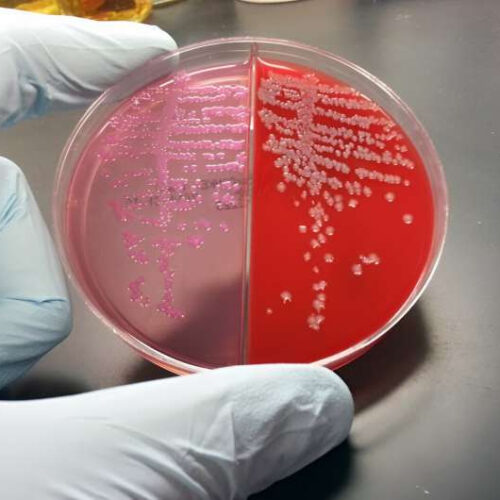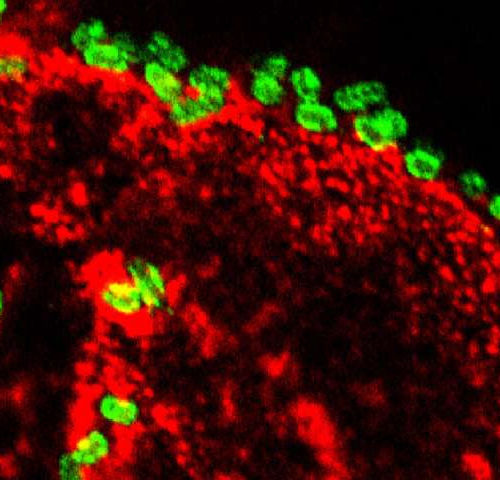by Leila Gray, University of Washington School of Medicine Microbiology lab media plates show E. coli bacteria growing on E. coli selective agar (pink) and blood agar (red). Credit: Sokurenko Lab/UW MedicineAfter a nearly three-fold drop in prescriptions for the antibiotic ciprofloxacin between 2015 and 2021, the rates of ciprofloxacin-resistant E. coli bacteria circulating in...
Tag: <span>E. coli</span>
Toxin provides clues to long-term effects of diarrhea caused by E. coli
by Tamara Bhandari, Washington University School of Medicine Toxin-producing E. coli bacteria (green) attach to human intestinal cells expressing the protein CEACAM6 (red). A study from researchers at Washington University School of Medicine in St. Louis has found that a toxin produced by E. coli changes intestinal cells to benefit itself, an ability that could provide a clue...
Chemical added to consumer products impairs response to antibiotic treatment
Grocery store aisles are stocked with products that promise to kill bacteria. People snap up those items to protect themselves from the germs that make them sick. However, new research from Washington University in St. Louis finds that a chemical that is supposed to kill bacteria is actually making them stronger and more capable of...
Cocktail of common antibiotics can fight resistant E. coli
A group of scientists in Denmark is trying to get one step ahead in the battle against antibiotic resistance. Today, many disease-causing bacteria acquire resistance genes, which make antibiotic treatment ineffective. Especially, one gene, CTX-M-15, encoding an extended spectrum beta-lactamase (ESBL) can lead to resistance in E. coli causing urinary tract infections. The team of...
New antibiotic approved for drug-resistant infections
A new antibiotic, developed with support from Wellcome, has been approved for patient use in the US. Urinary tract infections are caused by Enterobacteriaceae, such as E. Coli Credit: Carolina Biological Supply Company The US Food and Drug Administration (FDA) has approved the use of plazomicin (opens in a new tab)(brand name ZEMDRI) for the treatment...
E. Coli in an Electronic Pill Can Detect Bleeding in the Stomach
Researchers at MIT have developed an ingestible chip containing genetically engineered E. coli. When swallowed, the bacteria can detect blood in the stomach, and produce light. The chip contains components that measure the amount of light produced and relays this information to a nearby smartphone, allowing a simple and non-invasive diagnosis of gastrointestinal bleeding. In the past...
Engineered E. coli could color-code your poop to diagnose gut problems
Engineered E. coli has been shown to help diagnose gut problems in mice by expressing fluorescent proteins into their feces Humans have an uneasy relationship with bacteria – sure, they can make us very sick, but we also couldn’t live without the complex society residing in our guts. Now, researchers at Rice University have engineered E. coli to help...


